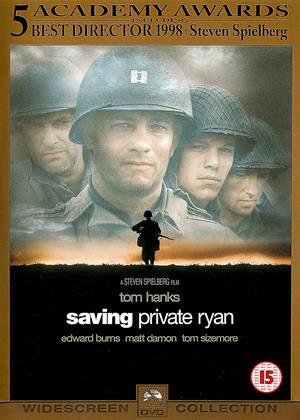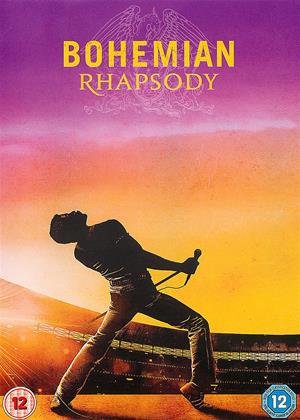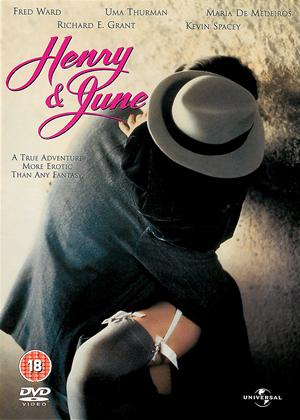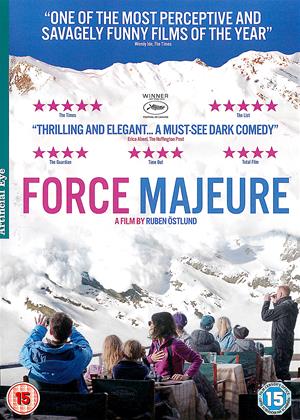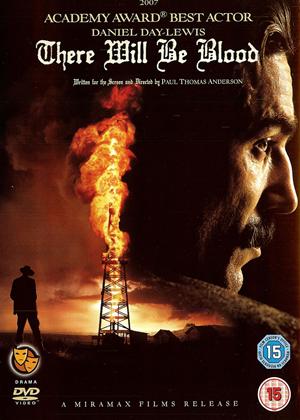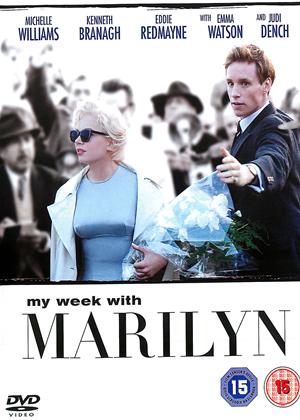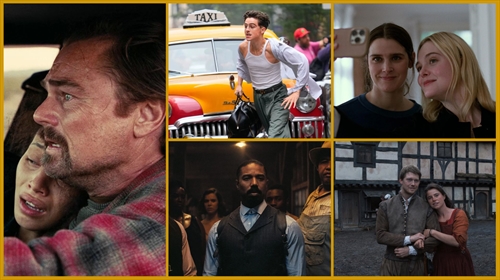The Oscar nominations have been announced and that can only mean one thing. It's time for Cinema Paradiso users to make their annual predictions!
As in previous years, Cinema Paradiso invites members to use their impeccable judgement to predict the winners in the 22 categories up for grabs at the 95th Academy Awards. So, why not cast your votes before Jimmy Kimmel takes to the stage at Hollywood's Dolby Theatre on Sunday 12 March?
BEST PICTURE

In expanding the Best Picture category from five to 10 titles in 2009, it was presumed that the Academy of Motion Picture Arts and Sciences was striving to narrow the perceived Oscar gap between films that achieved critical and commercial success. With cinema-going in decline across the United States in the wake of the Coronavirus pandemic, Hollywood has every reason to be grateful to the blockbusters that have lured Americans back into theatres. Thus, it's no surprise to see both Joseph Kosinski's Top Gun: Maverick and James Camerson's Avatar: The Way of Waterup for the top prize.
The latter's predecessor, Avatar (2009), was also nominated. But there was much grumbling when Tony Scott's Top Gun (1986) missed out on a major nomination and mainstream commentators have similarly complained that Tom Cruise merited a Best Actor nod for his gung-ho display as Pete 'Maverick' Mitchell. As co-producer, however, Cruise has his first Oscar nomination since his Best Supporting citation for Paul Thomas Anderson's Magnolia (1999). Voluble discontent has been expressed, however, over Ryan Coogler's Black Panther: Wakanda Forever not following its predecessor, Black Panther (2018), in putting Marvel on the Best Picture map.
Top Gun: Maverick has taken $718.7 million domestically and could be the first topper of the annual box-office chart to win Best Picture since Peter Jackson's The Lord of the Rings: The Return of the King (2003). It's also raked in $1.5 billion worldwide, while The Weight of Water has doubled the tally after a comparatively modest US take of $598.4 million. This means that the two films become the seventh and eighth million-dollar grossers to compete for Oscar's top prize, while this is the first time that two such movies have been ranged against each other. It's also the first time since 1982 that the two highest earners have both attained Best Picture status, as was the case when Steven Spielberg's E.T. the Extraterrestial and Sydney Pollack's Tootsie went toe to toe - and lost to Richard Attenborough's Gandhi.
The pair join a growing group of sequels that have been nominated for Best Picture, which already contains Leo McCarey's The Bells of St Mary's (1945), Francis Ford Coppola's The Godfather Part II (1974) and The Godfather Part III (1990), Peter Jackson's The Lord of the Rings: The Two Towers (2002) and The Lord of the Rings: The Return of the King (2003), Lee Unkrich's Toy Story 3 (2010), and George Miller's Mad Max: Fury Road (2015). Only the second listed Mario Puzo and J.R.R. Tolkien adaptations won, however.
The most nominated title on the list is Everything Everywhere All At Once, which has amassed 11 citations. Directed by Daniel Kwan and Daniel Scheinert, it's the fourth consecutive Best Picture nominee to centre on an Asian family, after Bong Joon-ho's Parasite (2019), Lee Isaac Chung's Minari (2020), and Ryusuke Hamaguchi's Drive My Car (2021). If it prevails, this multiverse comedy will be the first science-fiction film to win Best Picture, even though there were sci-fi elements in Guillermo Del Toro's The Shape of Water (2017) and some would consider fantasy to be part of the wider genre, thus, incorporating The Lord of the Rings: The Return of the King.
The film's 11 nods helped independent distributor A24 amass 18 nominations overall. This puts it second in the 'studio' rankings at the 2023 Oscars behind Disney, whose total of 22 includes those received by Fox Searchlight offerings. Netflix (16) pipped Universal (15), while Warner Bros (12) and Paramount (11) reached double figures. Of the only other survivors of the Hollywood heyday, United Artists and Sony Pictures Classics (which owns Columbia) landed two nominations each.

Three of this year's contenders were produced outside the United States. Although Elvis Aaron Presley was born in Tupelo. Mississippi and only left the country once (to do his National Service in West Germany), Baz Luhrman's Elvis was predominantly filmed in Australia. This isn't the first biopic of the King of Rock'n'Roll, as Kurt Russell took the title role in John Carpenter's Elvis (1979), while Michael Shannon teamed with Kevin Spacey in Liza Johnson's Elvis & Nixon (2016). Jacob Elordi is also set to play Elvis opposite Cailee Spaeny in Sofia Coppola's biopic, Priscilla, which wrapped in December 2022.
Mandy Walker can make Oscar history if she becomes the first woman to win Best Cinematography, after Rachel Morrison and Ari Wegner had been respectively nominated for Dee Rees's Mudbound (2017) Jane Campion's The Power of the Dog (2021), another film set in America but filmed Down Under (in New Zealand) and it took top prize. Another notable coup for Elvis sees Catherine Martin become the first person to receive nominations for Best Picture, Production Design, and Costume Design in the same year.
Ireland has outdone itself at the Oscars this year. Written and directed by Martin McDonagh, who has already been nominated for Best Picture with Three Billboards Outside Ebbing, Missouri (2017), The Banshees of Inisherin has racked up a record nine nominations. The story of an abruptly ended friendship set against the backdrop of the Irish Civil War, this dark dramedy will been joined at the ceremony by Colm Bairéad's An Cailín Ciúin (aka The Quiet Girl), the highest-grossing Irish-language film of all time, which has been nominated in the Best International Feature Film category. The cherry on top of the iced cake comes in the form of Tom Berkeley and Ross White's An Irish Goodbye, a Northern Irish story of sibling grief, that has been nominated for Best Live Action Short.

Also receiving nine nominations is Edward Berger's All Quiet on the Western Front, which is seeking to replicate the Best Picture success of Lewis Milestone's 1930 adaptation of Erich Maria Remarque's pacifist novel. This is now the second-most nominated foreign-language film after Ang Lee's Crouching Tiger, Hidden Dragon (2000) and Alfonso Cuarón's Roma (2018), which bagged 10 apiece. It also follows behind another non-English Great War classic, Jean Renoir's La Grande Illusion (1937), in being overlooked for Best Director while being nominated for Best Picture.
Having already become the first non-English film to be nominated for Best Visual Effects, Berger will also hope that his film can make a little more history, as neither Carol Reed's 1962 remake of Frank Lloyd's Mutiny on the Bounty (1935) nor Steven Spielberg's 2021 reimagining of Rober Wise and Jerome Robbins's West Side Story (1961) could emulate their predecessor's Best Picture wins.

This is the fifth year in a row that a non-English language film has been nominated for Best Picture, with Germany now boasting 21 nominations behind Spain's 32 and France's 40. However, Triangle of Sadness won't be adding to the Swedish tally of 16 nominations, despite being directed by Ruben Östlund, as it marks his English-language debut. Like The Square (2017), this satire on the uber-rich won the Palme d'or at Cannes. But only two films have ever done the double, Delbert Mann's Marty (1955) and Parasite. So, the odds seem stacked against Östlund, as they do for Todd Field's Tár and Sarah Polley's Women Talking.
Based on a novel by Miriam Toews, the latter is the only film that can complete a hat-trick of Best Picture winners directed by women, after Chloé Zhao's Nomadland (2020) and Sian Heder's CODA (2021). Improving its chances is the fact that it was co-produced by Frances McDormand, who won her third Best Actress Oscar for Nomadland after Joel Coen's Fargo (1996) and Three Billboards Outside Ebbing, Missouri.
McDormand's second nomination as a producer makes her the first woman to receive multiple Best Picture and acting nominations. Actor-turned-director Todd Field can't match this achievement, but he has racked up 14 nominations with his first three features: In the Bedroom (2001), Little Children (2006), and Tár. His personal total stands at six, with two each for Best Picture and Adapted Screenplay and one each for Original Screenplay and Best Director.
He has a way to catch up with Steven Spielberg, however, who is up for Best Picture with the semi-autobiographical yarn, The Fabelmans. He has previously graced the category with the self-directed E.T. the Extraterrestrial (1982), The Color Purple (1985), Saving Private Ryan (1998), Munich (2005), War Horse (2011), Lincoln (2012), Bridge of Spies (2015), The Post (2017), and West Side Story (2021). He also directed Jaws (1975) and Raiders of the Lost Ark (1981) to Best Picture nominations without producing and co-produced Clint Eastwood's Letters From Iwo Jima (2007). We'd say he was the favourite to triumph on 12 March, but Spielberg has only won Best Picture once, for Schindler's List (1993).
BEST DIRECTOR

Sticking with Steven Spielberg for a moment, his nomination for The Fabelmans brings him level with Martin Scorsese on nine Best Director nominations. They trail William Wyler on 12, but Spielberg has now tied Wyler's record of directing 13 Best Picture nominees and extended to 11 his record of individual Best Picture nominations. In remaining the only film-maker to be nominated for Best Director across six different decades, he has also put further distance between himself and Wyler for accumulated Oscar nods, with the seven for The Fabelmans taking his total to 146, which exceeds Wyler's by 19.
Several of these nominations will have gone to composer John Williams, who has received his 48th for his latest Spielberg collaboration. He also now holds the record for the most nominations for a living artiste, with 53, although he still trails Walt Disney with 59 (and 26 wins). Moreover, at 90 years 350 days when he was nominated, Williams has become the first nonagenarian to compete for an Academy Award (his first came in 1968, when he was 35). In so doing, he has taken the record for the oldest nominee that 89 year-old James Ivory and Agnès Varda set when they were recognised for respectively scripting Luca Guadagnino's Call Me By Your Name and co-directing the documentary feature, Faces Places (both 2017), with the photographer, JR.
Costume designer Ann Roth would equal their record for her work on George C. Wolfe's Ma Rainey's Black Bottom (2020). If he prevails, Williams will bring up his half-dozen wins after Norman Jewison's Fiddler on the Roof (1971), George Lucas's Star Wars (1977), and the Spielberg triptych of Jaws, E.T. the Extra-Terrestrial, and Schindler's List.

There won't be a hat-trick of wins for women directors following Chloé Zhao and Jane Campion, as the Academy opted to bypass Gina Prince-Bythewood (The Woman King), Charlotte Wells (Aftersun), Sarah Polley (Women Talking), Maria Schrader (She Said), and Chinonye Chukwu (Till). The '#OscarsSoWhite' hashtag also made a reappearance and Chukwu accused AMPAS of 'unabashed misogyny towards Black women'.
Slight racial redress was achieved with the nomination of Daniels Kwan and Scheinert for Everything Everywhere All At Once. Kwan is the third Asian American to be nominated for Best Director after M. Night Shyamalan for The Sixth Sense (1999) and Lee Isaac Chung for Minari (2020). Directorial double acts are rather rare at the Oscars. But Robert Wise and Jerome Robbins won for West Side Story, while much kudos was accrued by Warren Beatty and Buck Henry for Heaven Can Wait (1978), and Joel and Ethan Coen No Country For Old Men (2007) and True Grit (2010). How did the Academy ever overlook Gene Kelly and Stanley Donen for Singin' in the Rain (1952), though?
Just in case you still think Spielberg is nailed on and are heading to the Cinema Paradiso ballot to cast your vote, reflect on the other three candidates for Best Director.
As we have seen, Todd Field has hoovered up nominations for his three features and Tár was declared Film of the Year by more prominent newspaper critics than any other picture. Indeed, the story of a lesbian conductor who tries to control every aspect of her life became only the seventh feature ever to top the polls of the New York and Los Angeles critics circles, as well as the National Society of Film Critics. Field is a genuine contender, but it's a shame that Icelandic composer Hildur Guðnadóttir missed out for Best Score.
This is the first time that all five Best Director nominees are also nominated for writing the screenplays of their films. Indeed, Spielberg's shared nomination with Tony Kushner for Best Original Screenplay is his first ever nomination outside Best Picture and Best Director. This means that Martin McDonagh has one up on him, as he won the Oscar for Best Live-Action Short with Six Shooter (2004), which was his first attempt at writing and directing a film. He also has three nominations for Original Screenplay, thanks to In Bruges (2007), Three Billboards Outside Ebbing, Missouri (which also landed him a Best Picture nod), and The Banshees of Inisherin, which has already nabbed the Golden Globes for Best Screenplay and Best Motion Picture: Musical or Comedy.
Best Director, however, went to Spielberg, who also pipped The Daniels, Baz Luhrman, and James Cameron. The latter pair failed to make it on to the Oscar shortlist, with the berths going to Field and Swede Ruben Östlund for Triangle of Sadness. He has previously had The Square up for Best International Feature Film and made headlines when he made his displeasure at the snub for Force Majeure (2014) abundantly clear. Yet, despite picking up the Palme d'or, Östlund is unlikely to go one better than compatriots Jan Troell (The Emigrants, 1972), Ingmar Bergman (Cries and Whispers, 1972; Face to Face, 1976; and Fanny and Alexander, 1983), and Lasse Hallström ( My Life As a Dog, 1987 and The Cider House Rules, 1999) by converting his nomination into a statuette.
BEST ACTOR
The Best Actor stakes at the 95th Academy Awards are notable for a statistic that few presumed would ever be matched. Not since 1934 have all the nominees in this category been first-timers. The first men to be nominated twice were Wallace Beery and Fredric March, who followed respective citations for George Hill's The Big House and George Cukor's The Royal Family of Broadway (both 1930) by tying for the only time in the history of the category for their star turns in King Vidor's The Champ and Rouben Mamoulian's Dr Jekyll and Mr Hyde (both 1931).
For the years either side of the 5th Academy Awards, however, the nominees for Best Actor were all newcomers, which meant that Emil Jannings (Victor Fleming's The Way of All Flesh, 1927 and Josef von Sternberg's The Last Command, 1928), Warner Baxter (Raoul Walsh's In Old Arizona, 1928), George Arliss (Disraeli, 1929), Lionel Barrymore (Clarence Brown's A Free Soul, 1931), Charles Laughton (Alexander Korda's The Private Live of Henry VIII, 1933), and Clark Gable (Frank Capra's It Happened One Night, 1934) all converted their first nomination. Gable was only up against Frank Morgan for Gregory La Cava's The Affairs of Cellini and William Powell for W.S. Van Dyke's The Thin Man. But this was the last time until 2023 that none of the Best Actor nominees had received prior recognition.
By contrast, this peculiarity has occurred 11 times at the BAFTAs since the acting awards were unified in 1968. The only man missing from the British selection is Daryl McCormack for Sophie Hyde's Good Luck to You, Leo Grande. However, Ireland is still well represented with Colin Farrell's defriended Pádraic Súilleabháin in The Banshees of Inisherin and Paul Mescal as single father Calum Paterson in Aftersun respectively being the favourite and the outsider for the Oscar. They are the 10th and 11th Irishmen to compete for Best Actor, after Barry Fitzgerald ( Going My Way, 1944), Richard Todd (The Hasty Heart, 1949), Dan O'Herlihy (Robinson Crusoe, 1954), Richard Harris (This Sporting Life, 1963 & The Field, 1990), Kenneth Branagh (Henry V, 1989), Stephen Rea (The Crying Game, 1992), Liam Neeson (Schindler's List, 1993), and Michael Fassbender (Steve Jobs, 2015). The latter was actually born in Germany, but he holds dual citizenship, as does the only Irish winner in this category, Daniel Day-Lewis, who has a record three victories for Jim Sheridan's My Left Foot (1989), Paul Thomas Anderson's There Will Be Blood (2007), and Steven Spielberg's Lincoln (2012).
Farrell has a slight head start, as he has already won the award for Best Actor in a Comedy or Musical at the 80th Golden Globes. However, Austin Butler took the prize for Best Actor in a Drama for Elvis and Oscar loves a biopic, with a whopping 28 winners playing real-life characters. Rami Malek and Jamie Foxx each triumphed for playing singers - respectively Freddie Mercury in Bryan Singer's Bohemian Rhapsody (2018) and Ray Charles in Taylor Hackford's Ray (2004) - while Geoffrey Rush and James Cagney came up trumps as pianist David Helfgott in Scott Hicks's Shine (1996) and entertainer George M. Cohan in Michael Curtiz's Yankee Doodle Dandy (1942). Spurned nominees in musical biopics include Cornel Wilde as Frédéric Chopin in Charles Vidor's A Song to Remember (1945), Larry Parks as Al Jolson in Alfred E. Green's The Jolson Story (1946), Gary Busey in the title role of Steve Rash's The Buddy Holly Story (1978), Tom Hulce as Wolfgang Amadeus Mozart in Miloš Forman's Amadeus (1984), Laurence Fishburne as Ike Turner in Brian Gibson's What's Love Got to Do With It (1993), Joaquin Phoenix as Johnny Cash in James Mangold's Walk the Line (2005), Javier Bardem as bandleader Desi Arnaz in Aaron Sorkin's Being the Ricardos, and Andrew Garfield as songwriter Jonathan Larsen in Lin-Manuel Miranda's Tick, Tick...BOOM (both 2021).

At 73 years and 43 days, Bill Nighy has already become the seventh-oldest Best Actor nominee, behind Peter O'Toole (Venus, 2006), Clint Eastwood (Million Dollar Baby, 2004), Bruce Dern (Nebraska, 2013), and Richard Farnsworth (The Straight Story, 1999). If he wins for playing dying civil servant Rodney Williams in Oliver Hermanus's Living, however, he will be third behind 83 year-old Anthony Hopkins (The Father, 2020) and 76 year-old Henry Fonda (On Golden Pond, 1981).
The latter pair won for playing parents in strained relationships with their daughters, which is precisely the predicament in which Brendan Fraser's Charlie finds himself in Darren Aronofsky's The Whale. Will Smith also played a father seeking to inspire his daughters in King Richard (2021), while other winners for what we shall call 'domestic dramas' include Casey Affleck for Manchester By the Sea (2016), Sean Penn for Mystic River (2003), Kevin Spacey for American Beauty (1999), Dustin Hoffman for Kramer vs Kramer (1979), Ernest Borgnine for Marty (1955), and Fredric March for The Best Years of Our Lives (1946). Will Fraser cap a remarkable comeback by winning an Oscar? Click on the Cinema Paradiso ballot and follow your hunches.
BEST ACTRESS
Much of the talk since the nominations for Best Actress were announced has been about the absence of any Black performers. In the 95 editions of the Academy Awards, 83 have lacked a Black nominee in this category (with the number being 74 for Best Actor). The exclusion of Viola Davis for The Woman King and Danielle Deadwyler for Tillmeans that Halle Berry will remain the sole African American winner of the award for her work in Marc Forster's Monster's Ball (2001).
There has also been much scrutiny of Andrea Risbeborough's late push for a nomination for her performance as an alcoholic lottery winner in Michael Morris's To Leslie, which was filmed on a tiny budget in just 19 days. Riseborough launched a bid to secure a nomination using her own money and was quickly backed on social media by past winners Susan Sarandon (Dead Man Walking 1995), Helen Hunt (As Good As It Gets, 1997), and Mira Sorvino (Mighty Aphrodite, 1995). Zooey Deschanel, Alan Cumming, and Edward Norton also voiced their support, while former winners Kate Winslet (Titanic, 1997), Gwyneth Paltrow (Shakespeare in Love, 1998), and Charlize Theron (Monster, 2003) joined Melanie Lynskey, Jennifer Aniston, Courteney Cox, Minnie Driver, Amy Adams, and Frances Fisher in hosting screenings, Q&As, and virtual events to drum up support. While accepting the Critics Choice Award for Tár, Cate Blanchett also gave Riseborough a shout-out.
They are now rivals, as Blanchett seeks to add to the Oscar she won for Woody Allen's Blue Jasmine (2013). She also has a Best Supporting statuette for her vicacious turn as Katharine Hepburn in Martin Scorsese's The Aviator (2004), which made her the first person to win an Academy Award for portraying an Oscar winner. Moreover, she has previously been nominated in this category for Shekhar Kapur's Elizabeth (1998) and Elizabeth: The Golden Age (2008), as well as Todd Haynes's Carol (2015), while her other Best Supporting nods came for Richard Eyre's Notes on a Scandal (2006) and Haynes's I'm Not There (2007), in which Blanchett played Bob Dylan.
Centring on a lesbian conductor whose life starts to unravel, Tár is the 10th Best Picture nominee in which Blanchett has featured. This is a record for an actress and it ties her with Jack Nicholson and Leonardo DiCaprio. They all remain one behind Robert De Niro, however. Blanchett is also one of two Australians to have won the Oscar for Best Actress, with Nicole Kidman being the first for her performance as Virginia Woolf in Stephen Daldry's The Hours (2002).

Merle Oberon claimed to have been born in Tasmania when she won the award for Sidney A. Franklin's The Dark Angel (1935). In fact, she hailed from Mumbai (which was then known as Bombay) and spent her life avoiding questions about the Sri Lankan mother of Maori descent who had given birth to her at the age of 12. As Oberon didn't acknowledge her origins, it has been deemed that Michelle Yeoh is the first Asian to be nominated for Best Actress for her performance as stressed laundromat owner, Evelyn Wang, in Everything Everywhere All At Once. However, Natalie Portman, who won for Darren Aronofsky's Black Swan (2010), was born in Israel, which is very much situated in Asia, despite the country's sporting and cultural connections (eg UEFA and Eurovision) with Europe.
Hailing from Malaysia, Yeoh competed for the title of Miss World in 1983 and caught the attention of a Hong Kong film producer at another beauty pageant in Australia. Although she already has a BAFTA nomination for Crouching Tiger, Hidden Dragon, this is his first Oscar recognition and it comes after she won the Golden Globe for Best Actress in a Musical or Comedy.
Although she has two Golden Globes, Michelle Williams has yet to convert any of her four Oscar nominations prior to being shortlisted for what some have claimed is the supporting role of Mitzi Schildkraut-Fabelman in The Fabelmans. In addition to Best Supporting citations for Ang Lee's Brokeback Mountain (2005) and Kenneth Lonergan's Manchester By the Sea, Williams also has Best Actress nods for Derek Cianfrance's Blue Valentine (2010) and Simon Curtis's My Week With Marilyn (2011).
Marilyn Monroe missed out on the Oscars, although she drew BAFTA nominations for Billy Wilder's The Seven-Year Itch (1955) and Laurence Olivier's The Prince and the Showgirl (1957). She also followed a nomination for Joshua Logan's Bus Stop (1956) with a Golden Globe win for Wilder's Some Like It Hot (1959). Now, however, Ana de Armas becomes the second to receive a Best Actress nomination for playing Monroe after her performance as Norma Jeane Mortensen in Andrew Dominik's Blonde. Poppy Montgomery had previously taken the role in Joyce Chopra's Blonde (2001), which was also based on the bestselling book by Joyce Carol Oates.
Rated NC-17, Blonde is only the second Oscar nominee with that certificate since Philip Kaufman's Henry & June (1990), which had the dubious distinction of being the very first film to receive the classification. Three X-rated movies had previously drawn Oscar recognition, Bernardo Bertolucci's Last Tango in Paris (1972), Stanley Kubrick's A Clockwork Orange (1971), and John Schlesinger's Midnight Cowboy (1969), which is the only X-rated winner of the Academy Award for Best Picture.
De Armas may have become the first Cuban to be nominated in this category (although Andy Garcia snagged a Best Supporting Actor nod for The Godfather Part III), but she's avoided becoming the first Best/Worst Actress recipient in the Oscar/Razzie stakes, even though her film led the 2023 Golden Raspberry list with eight nominations. Only Best Supporting candidates Amy Irving for Barbra Streisand's Yentl (1983), James Coco for Glenn Jordan's Only When I Laugh (1981), and Glenn Close for Ron Howard's Hillbilly Elegy (2020) have received Oscar and Razzie nominations for the same performance, although an amusingly large number of Oscar winners have Razzies in their collections. The classiest winner, however, has to be Sandra Bullock, whose Oscar win for The Blind Side came the night after she had shown up in person to collect her brace of Razzies for Worst Actress and Worst Couple (with Bradley Cooper) in Phil Traill's All About Steve (both 2009).
You don't need to worry about the Worsts. Only the Bests are up for consideration in our prediction competition. There's six months of free Cinema Paradiso rentals on offer for the winner. Click here to register your entry.
BEST SUPPORTING ACTRESS
Seven of this year's 20 acting nominees are non-white performers. The only one who has been nominated before is Angela Bassett, who has had to wait 29 for a second tilt at an Oscar after missing out as Tina Turner in What's Love Got to Do With It (1993). She joins Joe Pesci (GoodFellas, 1990 & The Irishman, 2019) on this number, although she still lags behind Lynn Redgrave (32 years between Georgy Girl, 1966 and Gods and Monsters, 1998) and Helen Hayes (39 years between The Sin of Madelon Claudet, 1931 and Airport, 1970), as well as Henry Fonda and Judd Hirsch, who will shall come on to shortly.

Hayes may have the record for the longest gap between Oscar wins. But Bassett's nomination as Queen Ramonda in Black Panther: Wakanda Forever makes her the first performer ever to receive Oscar recognition for a Marvel Cinematic Universe film. There are DC Comics precedents, however, as Heath Ledger (posthumously) and Joaquin Phoenix respectively won Best Supporting and Best Actor for romping as The Joker in Christopher Nolan's The Dark Knight (2008) and Todd Phillips's Joker (2019).
If she wins, Bassett won't be the first Black actress to take this category, but she will join an exclusive club that includes Hattie McDaniel as Mammy in Victor Fleming's Gone With the Wind (1939), Whoopi Goldberg as Oda Mae Brown in Jerry Zucker's Ghost (1990), Jennifer Hudson as Effie White in Bill Condon's Dreamgirls (2006), Mo'nique as Mary Lee Johnston in Lee Daniels's Precious (2009), Octavia Spencer as Minny Jackson in The Help, Lupita Nyong'o as Patsey in Steve McQueen's 12 Years a Slave (2012), Viola Davis as Rose Maxon in Fences, Regina King as Sharon Rivers in Barry Jenkins's If Beale Street Could Talk (2017), and Ariana DeBose as Anita in Steven Spielberg's West Side Story (2021).

For the first time in Oscar history, two Asian Americans are up for Best Supporting Actress in the same year. South Korea's Youn Yuh-jung was the first Asian winner in this category for Minari (2020). But Hong Chau could repeat her BAFTA/Oscar double after her caring display as Liz in The Whale, which built on the fine impression left by her turn as the dissident Ngoc Lan Tran in Alexander Payne's Downsizing (2017). This would be one of the stories of the night, as Chau was born in a Thai refugee camp to Vietnamese boat parents, who were invited to come to the USA by a Catholic Church in New Orleans.
Stephanie Hsu's grandmother settled in America after fleeing China following the Communist takeover in 1949. By being shortlisted for her work as Joy Wang and Jobu Tupaki in Everything Everywhere All At Once, Hsu has become the first openly queer performer to be nominated for portraying a queer character since Ian McKellen essayed Hollywood director James Whale in Bill Condon's Gods and Monsters (1998).
Hsu isn't the only member of the Everything Everywhere cast up for nomination, however, as Jamie Lee Curtis has also been recognised for her display as IRS inspector Deirdre Beaubeirdre. This is the 36th time such a doubling has occurred in Oscar history, with the head-to head wins being Hattie McDaniel over Olivia De Havilland in Gone With the Wind (1939), Teresa Wright over May Whitty in Mrs Miniver (1942), Celeste Holm over Anne Revere in Gentleman's Agreement (1947), Helen Hayes over Maureen Stapleton in Airport (1970), Cloris Leachman over Ellen Burstyn in The Last Picture Show (1971), Tatum O'Neal over Madeleine Kahn in Paper Moon (1973), Meryl Streep over Jane Alexander in Kramer vs Kramer, and Jessica Lange over Teri Garr in Tootsie (1982).
Curtis finds herself in the same category in which mother Janet Leigh had competed as Marion Crane in Alfred Hitchcock's Psycho (1960). Father Tony Curtis was nominated alongside co-star Sidney Poitier in Stanley Kramer's The Defiant Ones (1958), which makes Curtis the third performer to follow in the footsteps of Oscar-nominated parents.
Liza Minnelli led the way, when her Best Actress win for Bob Fosse's Cabaret (1972) followed on from father Vincente Minnelli's Best Director nomination for the Best Picture-winning An American in Paris and his win for Gigi (1959) and mother Judy Garland had garnered a Best Supporting nomination for Stanley Kramer's Judgement At Nuremberg (1961). Subsequently, Diane Ladd and Laura Dern became the first mother-daughter duo to be nominated for appearing in the same picture, when Dern was nominated for Best Actress and Ladd for Best Supporting in Martha Coolidge's Rambling Rose (1991). Dern has since won the Best Supporting category for Noah Baumbach's Marriage Story (2019) after being nominated for Jean-Marc Vallée's Wild (2014). Completing the family roll of honour, Bruce Dern followed a Best Supporting nomination for Hal Ashby's Coming Home (1978) with a Best Actor nod for Alexander Payne's Nebraska (2014).
Kerry Condon can't call on such heritage. But her inclusion on the 95th Oscar shortlist is more than merited, as she excels as Siobhán Súilleabháin in The Banshees of Inisherin. She had previously worked on stage with Martin McDonagh in The Lieutenant of Inishmore (2001), when she was just 18, and The Cripple of Inishmaan (2009). They reunited on Three Billboards Outside Ebbing, Missouri and Condon now becomes the lucky seventh Irish actress to be nominated in this category. Geraldine Fitzgerald (Wuthering Heights, 1939), Sara Allgood (How Green Was My Valley, 1941), Patricia Collinge (The Little Foxes, 1941), Saoirse Ronan (Atonement, 2007), and Jessie Buckley (The Lost Daughter, 2021) all missed out. However, Condon could emulate Brenda Fricker, who won for playing Bridget Fagan Brown in My Left Foot (1989).
BEST SUPPORTING ACTOR
Thanks to Everything Everywhere All At Once and The Banshees of Inisherin, this is the first year since 1992 in which there have been dual nominees in two acting categories. Back then, it was Susan Sarandon and Geena Davis going head to head in Ridley Scott's Thelma & Louise and Harvey Keitel and Ben Kingsley weighing each other up for Warren Beatty's Bugsy (both 1991). Now, it's Brendan Gleeson and Barry Keoghan who are up against each other in Martin McDonagh's flinty comedy.

They don't share much screen time as Colm Doherty and Dominic Kearney, but they are the 22nd co-starring twosome (and the fifth in six years) to be nominated for Best Supporting Actor. To date, the winners of these direct showdowns are Ben Johnson over Jeff Bridges in The Last Picture Show, Robert De Niro over Michael V. Gazzo and Lee Strasberg in The Godfather (1972), Jason Robards over Maximilian Schell in Julia (1977), Timothy Hutton over Judd Hirsch in Ordinary People (1980), Jack Nicholson over John Lithgow in Terms of Endearment (1983), Sam Rockwell over Woody Harrelson in Three Billboards Outside Ebbing, Missouri (2017), and Daniel Kaluuya over Lakeith Stanfield in Judas and the Black Messiah (2021).
Mention of Judd Hirsch is significant, as his 42-year wait for a second nomination since Robert Redford's Best Picture winner has knocked Henry Fonda into second place, after he endured 41 years between John Ford's The Grapes of Wrath (1940) and Mark Robson's On Golden Pond (1981). Fonda won the Best Actor prize for the latter and Hirsch managed to fend off co-star Paul Dano to receive a Best Supporting nod as Boris Schildkraut in The Fabelmans. At 87 years and 315 days, he becomes the second oldest acting nominee behind Christopher Plummer, who was 88 years and 41 days when he was nominated (and won) for playing Hal Fields in Mike Mills's Beginners (2010).
Clocking in at eight minutes and three seconds, Hirsch's performance is the seventh-shortest to be recognised in the category behind Charles Durning (7:26 in The Best Little Whorehouse in Texas, 1982), Maximilian Schell (6:49 in Julia), John Lithgow (6:28 in Terms of Endearment), Basil Rathbone (6:16 in Romeo and Juliet, 1936), John Marley (6:03 in Love Story, 1970), and Ned Beatty (6:00 in Network, 1976).
British audiences have had scant opportunity to gauge Brian Tyree Henry's performance as James Aucoin in Lila Neugebauer's Causeway. Indeed, he lands his Oscar nomination without being recognised by either the Golden Globes or the Screen Actors Guild. But he could become the eighth Black winner after Lou Gossett, Jr. for Taylor Hackford's An Officer and a Gentleman (1982), Denzel Washington for Edward Zwick's Glory (1989), Cuba Gooding, Jr. for Cameron Crowe's Jerry Maguire (1996), Morgan Freeman for Clint Eastwood's Million Dollar Baby (2004), Mahershala Ali for Barry Jenkins's Moonlight (2016) and Peter Farrelly's Green Book (2018), and Daniel Kaluuya for Shaka King's Judas and the Black Messiah (2021).
Not since Fred Zinnemann's Julia and Herbert Ross's The Turning Point (both 1977) have two films each received four acting nominations. We've met everyone from The Banshees of Inisherin and now complete the roll call of Everything Everywhere All At Once with Ke Huy Quan, who is considered a racing certainty by many for the Oscar for his turn as harassed husband, Waymond Wang.

This is his first film role since quitting acting in 1998 after having tasted success as a child actor, most notably as Short Round in Steven Spielberg's Indiana Jones and the Temple of Doom (1984) and as Richard 'Data' Wang in Richard Donner's The Goonies (1985). The second Vietnamese refugee up for nomination this year, Quan already has a Golden Globe on his mantelpiece. But could there still be a surprise when the envelope is opened on 12 March?
TERMS AND CONDITIONS
That concludes our round-up of the major categories on the AMPAS ballot. But you're on your own for the other 16!
To take part in this competition, all you have to do is tell us who you think will win each category at the 95th Academy Awards.
Whoever correctly predicts the highest number of winners will receive SIX MONTHS of free rentals from CinemaParadiso.co.uk.
In the result of a tie, the top predictors will be entered in a draw to find ONE lucky winner.
The competition will close at 12:00 on Sunday 12 March 2023 and the winner will be announced on Monday 13 March 2023.
One entry per customer and everyone with a Cinema Paradiso account is welcome to take part. Good luck!












































